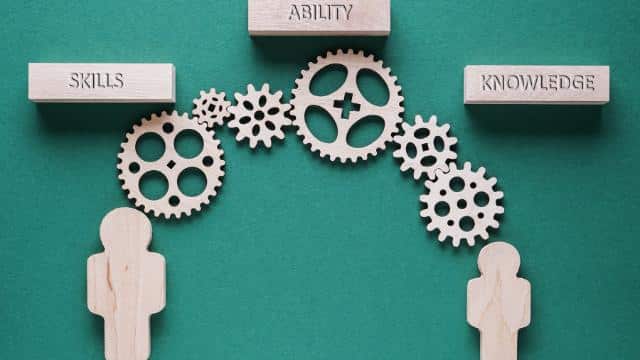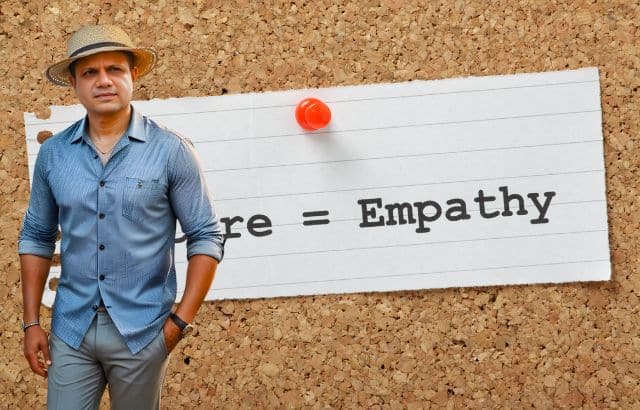Essential soft skills- In today’s competitive job market and rapidly changing professional landscape, having the right technical skills and qualifications is no longer enough to guarantee success. Employers are increasingly recognizing the value of soft skills, which can set you apart from the crowd and make a significant difference in your career trajectory. In this blog, we’ll explore the importance of soft skills and how they can be your secret weapon for success.
Customers have gotten smarter. They are tolerating fewer service failures. They are demanding better because they know it’s possible. To cater to such demands businesses have to deploy soft skills into all employees, service providers, managers and unit heads, or they have to self-train themselves, Opines Hirav Shah, Thought leader and Business Strategist.
Soft skills are the more intangible and non-technical abilities that are sought from candidates.
For example: Communication, teamwork, problem-solving, leadership, responsibility,etc.
However, apart from these traditional and most sought after soft skills required at the workplace, having the below-mentioned seven soft skills can set you apart from the crowd , Says Hirav Shah.
Table of Contents
Why Are Soft Skills Important?

- Differentiation: In a crowded job market, having strong soft skills can distinguish you from other candidates with similar qualifications. Employers are looking for candidates who can bring more than just technical expertise to the table.
- Career Advancement: Soft skills are often the key to advancing in your career. Effective communication, leadership, and teamwork can lead to promotions and greater responsibilities.
- Collaboration: Soft skills are essential for effective collaboration in the workplace. They enable you to work harmoniously with colleagues, clients, and superiors, fostering a positive and productive work environment.
- Problem Solving: Soft skills like critical thinking and creativity are critical for solving complex problems and driving innovation within organizations.
- Adaptability: As industries evolve and technologies change, the ability to adapt is crucial. Soft skills like adaptability and resilience enable you to thrive in dynamic environments.
- Customer Relations: If you work in a customer-facing role, strong soft skills can lead to better customer relations, repeat business, and positive reviews.
What Are Soft Skills?

Soft skills, often referred to as interpersonal or people skills, are a set of personal attributes that enable individuals to interact effectively with others in various professional and social situations. Unlike hard or technical skills, which are specific to a particular job or industry, soft skills are transferable and can be applied across a wide range of roles and industries. Some common soft skills include:
- Communication: The ability to convey ideas and information clearly and concisely, both verbally and in writing. Effective communication is vital for collaboration, leadership, and problem-solving.
- Teamwork: The capacity to work cooperatively with others, contribute to group goals, and resolve conflicts constructively. Team players are highly sought after in organizations.
- Adaptability: The flexibility to adjust to new situations and challenges. In today’s rapidly changing world, adaptability is a critical skill for staying relevant.
- Problem-Solving: The aptitude to analyze issues, think critically, and find creative solutions. Problem solvers are invaluable in solving complex problems and driving innovation.
- Leadership: The ability to inspire and guide others, set a vision, and lead by example. Effective leadership can propel your career to new heights.
- Time Management: The skill of managing time efficiently, prioritizing tasks, and meeting deadlines. Good time management enhances productivity and reduces stress.
- Emotional Intelligence: The capacity to recognize and manage your emotions and understand the emotions of others. Emotional intelligence fosters better relationships and decision-making.
7 Soft Skills can set you apart from the crowd
1. Creativity

Organizations need people who can creatively approach problems and tasks across all business roles, from software engineering to HR. Focus on honing your ability to bring new ideas to the table .
2.Persuasion

Leaders and hiring managers value individuals who can explain the “why.” To advance your career, brush up on your ability to effectively communicate ideas and persuade your colleagues and stakeholders that it’s in their best interest to follow your lead.
3. Collaboration

High-functioning teams can accomplish more than any individual—and organizations know it. Learn how your strengths can complement those of your colleagues to reach a common goal.
4.Adaptability

The only constant in life—and in business—is change. To stand out , embrace that reality and make sure to show up with a positive attitude and open-minded professionalism, especially in stressful situations. In a nutshell, learn to be adaptive.
5.Emotional Intelligence

Emotional intelligence is the ability to perceive, evaluate, and respond to your own emotions and the emotions of others. New to the most in-demand skills list this year, the need for emotional intelligence underscores the importance of effectively responding to and interacting with our colleagues.
6. Bringing it all together

Bringing it all together is a vital skill to master. When things go haywire, when customers complain, when stake-holders are not satisfied ; if you can bring it all together, then the world is all yours. There are more instances like employee unrest or workers’ strike or any unforeseen circumstance for that matter. Many CEOs have been declared unfit just because they couldn’t properly cultivate this skill. So, make sure you try to “bring it all together” and help any haywire situation reach its logical closure.
7. Empathy

Brand loyalty is a paradox in itself – it is infinitely complex, yet seemingly simple. There are multiple factors and innumerable moving pieces at play when it comes to driving a simple goal: consideration for one brand over another, even when the value proposition is equal.
Connecting with consumers and other stakeholders requires building multiple bridges, and experience tells us that the strongest bridges are those that resonate on an emotional level. Driven by emotional chords, brand loyalty is maintained outside of the product value through the gravitational pull of empathy.
Developing Your Soft Skills

Now that you understand the importance of soft skills, how can you develop and hone them to set yourself apart from the crowd? Here are some practical tips:
- Self-awareness: Start by identifying your strengths and areas for improvement. Self-awareness is the foundation for building soft skills.
- Seek Feedback: Ask for feedback from colleagues, mentors, or supervisors. Constructive criticism can help you identify areas where you can improve.
- Training and Workshops: Consider taking workshops or courses on specific soft skills you want to enhance, such as public speaking, conflict resolution, or emotional intelligence.
- Practice: Soft skills are like muscles; they need regular exercise. Look for opportunities to practice your skills in your personal and professional life.
- Mentorship: Seek out a mentor who can provide guidance and support as you work on developing your soft skills.
- Reading and Learning: There are plenty of books, articles, and online resources that can provide insights and strategies for improving your soft skills. Make learning a continuous process.

What are the essential soft skills for career success?
Answer: Essential soft skills for career success include communication, emotional intelligence, adaptability, problem-solving, time management, teamwork, and leadership.
Why is communication considered an essential soft skill?
Answer: Communication is essential because it helps convey ideas clearly, build relationships, and resolve conflicts effectively, all of which are crucial in any professional setting.
How does emotional intelligence impact professional success?
Answer: Emotional intelligence enhances professional success by improving interpersonal relationships, fostering teamwork, and enabling better management of one’s emotions and responses.
What makes adaptability an important soft skill?
Answer: Adaptability is important because it allows individuals to navigate changes, embrace new challenges, and stay relevant in a constantly evolving business environment.
Why is problem-solving a crucial soft skill?
Answer: Problem-solving is crucial as it involves critical thinking and finding innovative solutions to complex issues, making it highly valued across all industries.
How does time management contribute to career advancement?
Answer: Time management contributes to career advancement by ensuring productivity, meeting deadlines, and effectively balancing multiple tasks or projects, which leads to better performance and results.
What role does teamwork play in professional development?
Answer: Teamwork plays a significant role in professional development by fostering collaboration, enhancing communication, and leading to successful project outcomes in a positive work environment.
How can leadership skills set you apart in your career?
Answer: Leadership skills set you apart by enabling you to inspire and guide others, make informed decisions, and take responsibility, all of which are key traits of an effective leader.
Conclusion

In today’s competitive world, soft skills can truly set you apart from the crowd. They not only enhance your employability but also contribute to your overall personal and professional growth. Whether you’re a recent graduate entering the job market or a seasoned professional looking to advance in your career, investing in your soft skills can be the key to unlocking new opportunities and achieving success. So, embrace the power of soft skills and watch as they become your secret weapon for standing out in any crowd.
“While future promises good times ahead for businesses, there are things that may not be under your control and you may have to be more conscious about it. Here’s where Astro-Strategy will help you.
In other words, this year is set out to bring positive changes in businesses. It will bring good vibes and prosperity at large. Though there will be dark aspects also, you can manage the situation certainly with only an Astro-Strategic consultation”. Concludes Hirav Shah, India’s Top Astro-Strategist & Business Astrologer.










